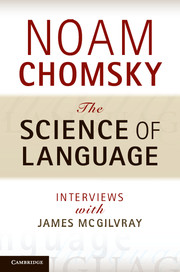Book contents
- Frontmatter
- Contents
- Introduction
- Part I The science of language and mind
- Part II Human nature and its study
- 15 Chomsky on human nature and human understanding
- 16 Human nature and evolution: thoughts on sociobiology and evolutionary psychology
- 17 Human nature again
- 18 Morality and universalization
- 19 Optimism and grounds for it
- 20 Language, agency, common sense, and science
- 21 Philosophers and their roles
- 22 Biophysical limitations on understanding
- 23 Epistemology and biological limits
- 24 Studies of mind and behavior and their limitations
- 25 Linguistics and politics
- Appendices
- Commentaries
- Glossary
- Bibliography
- Index
16 - Human nature and evolution: thoughts on sociobiology and evolutionary psychology
from Part II - Human nature and its study
Published online by Cambridge University Press: 05 June 2012
- Frontmatter
- Contents
- Introduction
- Part I The science of language and mind
- Part II Human nature and its study
- 15 Chomsky on human nature and human understanding
- 16 Human nature and evolution: thoughts on sociobiology and evolutionary psychology
- 17 Human nature again
- 18 Morality and universalization
- 19 Optimism and grounds for it
- 20 Language, agency, common sense, and science
- 21 Philosophers and their roles
- 22 Biophysical limitations on understanding
- 23 Epistemology and biological limits
- 24 Studies of mind and behavior and their limitations
- 25 Linguistics and politics
- Appendices
- Commentaries
- Glossary
- Bibliography
- Index
Summary
JM: Looking at how you have studied human nature now, could we begin by looking at some apparent differences between your approach to the biological study of human nature and that pursued by sociobiologists and evolutionary psychologists such as Wilson, Pinker, Dawkins, and many others. They seem to think that the science of human nature should aim to explain human behavior, and they conceive of the various biologically based affects and cognitive capacities on which they focus as biologically evolved in the long-term selectional way that neo-Darwinists favor. Your approach to the science of human nature pays scant attention to the explanation of behavior – in fact you've maintained since at least the late 1950s that while our everyday intentional, commonsense accounts of behavior might be successful enough for practical purposes, the scientific explanation of behavior is a hopeless project, except perhaps for extremely simple organisms. And while you have no objection to seeking selectional accounts of the development of affects and cognitive capacities, you emphasize in the case of human language – certainly the most distinctive and central mental faculty, one that no other creature has, and that seems to underlie many of our cognitive accomplishments – there is no evidence that a long-term selectional story will work. There are reasons to think that language was introduced at a single stroke with the introduction of Merge, perhaps some fifty or sixty thousand years ago. Could you comment on these apparent differences, and on what we might hope to accomplish in a naturalistic science of human nature?
NC: First of all, just to be historically accurate, what's now called evolutionary psychology or sociobiology begins with Kropotkin in his critique of social Darwinism. But he was a Darwinist. He argued on selectional grounds that you would expect what he called “mutual aid” – cooperative societies that happened to be his vision of communitarian anarchism. Well, why is Kropotkin disregarded? – because people don't like his conclusions. If you mention him to Dawkins and so on, they'll just ridicule him. Now is it because he didn't have any evidence? Well, he didn't have any relevant scientific evidence. Does anyone have such evidence for anything else? Barely. They don't like his conclusions.
There are several different questions here. What is the nature – what is human nature, or ant nature? Well, those are scientific questions. Separate from that is the question of what role selection had in developing them. And those are just two different scientific questions, not to be intermingled. Part of the problem with the kind of pop biology that's common today is they're just intermingled – it's assumed that if there's a nature, it's got to be selected. It doesn't make any sense – it doesn't make any sense for the kidney or the visual system or anything else, and it doesn't make any sense here.
- Type
- Chapter
- Information
- The Science of LanguageInterviews with James McGilvray, pp. 103 - 107Publisher: Cambridge University PressPrint publication year: 2012



